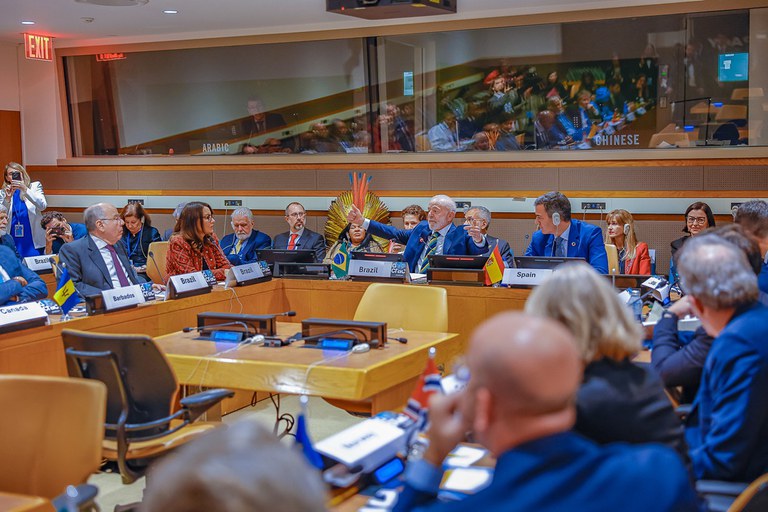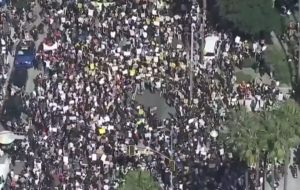
Published 09/25/2024 15:41 | Edited 09/25/2024 15:44
At the invitation of the President of Brazil, Luiz Inácio Lula da Silva, and the President of Spain, Pedro Sánchez, leaders and representatives of 13 countries and international organizations met in New York on Tuesday (24) to discuss the growing threats to democracy and freedom posed by extremist movements around the world. The leaders of Barbados, Cape Verde, Canada, Chile, Colombia, the United States, France, Mexico, Norway, Kenya, Senegal, East Timor, as well as the President of the European Council, Charles Michel, and the Deputy Secretary-General of the United Nations, Guy Rider, participated in the meeting.
At an event held on the sidelines of the United Nations General Assembly entitled “In Defense of Democracy: Fighting Extremism,” President Lula gave a speech highlighting the global challenges faced by democracies, alongside leaders of several nations and international organizations. At the beginning of his speech, he emphasized that democracy has never been so threatened since World War II. “In Brazil and the United States, totalitarian forces have carried out violent actions to challenge the results of the ballot box,” the president stated, referring to extremist attacks against electoral legitimacy in both countries.
Prime Minister Pedro Sánchez reinforced Lula’s words, warning that democracy is under attack by extremist movements that have powerful sources of funding. And he stressed that the response must be firm: “We must respond to the enemies of democracy with the same determination that they use.”
The debate, which focused on the need to strengthen the defense of democracy, expressed deep concern about the growth of groups that promote attacks on the rule of law, human rights and fundamental freedoms. The leaders highlighted that political polarization, extremism and the spread of disinformation are transnational phenomena that are undermining the social fabric, fueling violence and instability.
Inequality and misinformation as drivers of the crisis
During the discussions, some leaders warned that rising inequality, both within and between countries, is at the root of the popular discontent that drives these extremist movements. The failure of many nations to deliver tangible improvements in the lives of their citizens and the erosion of the middle classes have contributed to growing frustration with governments and politics, creating a fertile environment for the proliferation of hate speech and destabilizing narratives.
Lula argued that extremism is a symptom of deeper crises, stemming from multiple causes, pointing out flaws in liberal democracy itself. “It has become nothing more than a ritual that we repeat every 4 or 5 years,” he said, emphasizing that social exclusion and economic inequalities have fueled global discontent. For him, a democracy that privileges only an economic elite and ignores the needs of workers cannot be called democratic. “Abundance for the few and hunger for the many in the 21st century is the antechamber to totalitarianism,” he warned.
Lula defended the need for the economy to be placed at the service of the people, without giving up the free market, but with an active role for the State in planning sustainable development and ensuring well-being and equity. “This does not mean ending the free market, but rather recovering the role of the State,” explained the president.
On the other hand, the threat posed by the spread of misinformation and fake news was highlighted, which erodes trust in institutions and hinders informed participation in public life. The manipulation of public opinion through the use of virtual armies and hate speech, amplified by the advance of Artificial Intelligence, were identified as obstacles to the preservation of democratic values. This limits the participation of minorities and restricts freedoms, contributing to distrust in electoral systems and in the concept of democracy itself.
Lula also emphasized that freedom of expression, although a fundamental right, is not absolute. “It finds its limits in the protection of the rights and freedoms of others, and of the political order itself,” he said, referring to the dissemination of hate speech on digital platforms.
In the field of digital technologies, the Brazilian president was firm in defending the regulation of platforms and the control of the use of artificial intelligence. He stated that social networks have become fertile ground for racist, misogynistic and xenophobic hate speech. “Our societies will be under constant threat until we are firm in regulating the platforms,” he warned, adding that no company or individual, no matter how rich they are, is above the law. Digital platforms, according to Lula, need to be held accountable for the content they disseminate.
Democracy: a common and plural value
The leaders present reaffirmed that while democracy takes different forms in different parts of the world, certain principles are universal: free and fair elections, political transparency, separation of powers, equal protection under the law, an independent press, and a pluralistic and trustworthy information ecosystem. These elements form the basis for prosperous, inclusive and pluralistic societies.
It was also emphasized that democracy cannot be imposed, but must emerge from the freely expressed will of people to determine their own political, economic and social systems. According to the participants, strengthening democracy involves promoting social well-being, combating hunger and inequality, and fostering decent work.
Throughout his speech, Lula emphasized the importance of social participation in strengthening democracy, stressing that democracy should not be a pact of silence. “We need to listen to social movements, students, women, workers, entrepreneurs, racial, ethnic and religious minorities,” he said, defending the protection of human rights, the environment and defenders of democracy.
Gender, diversity and digital technologies
The meeting also highlighted the importance of gender equality and women’s full participation in policymaking as a cornerstone of inclusive and resilient democracies. The leaders emphasized that racism, xenophobia and religious intolerance are incompatible with democratic values and pose serious threats to political pluralism and diversity.
The use of digital technologies by extremist groups to spread disinformation and incite violence also received special attention. Participants unanimously agreed that combating this phenomenon requires a coordinated effort between governments, technology companies and civil society to ensure the integrity of information and preserve the proper functioning of democracies.
Heading to Santiago
At the end of the meeting, the leaders expressed their commitment to strengthening democratic institutions and processes in their countries and coordinating efforts to address global challenges to democracy. The President of Chile offered to host a future summit in Santiago, with the aim of continuing the dialogue on ways to strengthen democracy, including engagement with think tanks and civil society.
This meeting in New York reaffirms the role of international cooperation in tackling contemporary challenges, reinforcing the universal value of democracy and the global commitment to freedom, equality and social justice.
Source: vermelho.org.br

